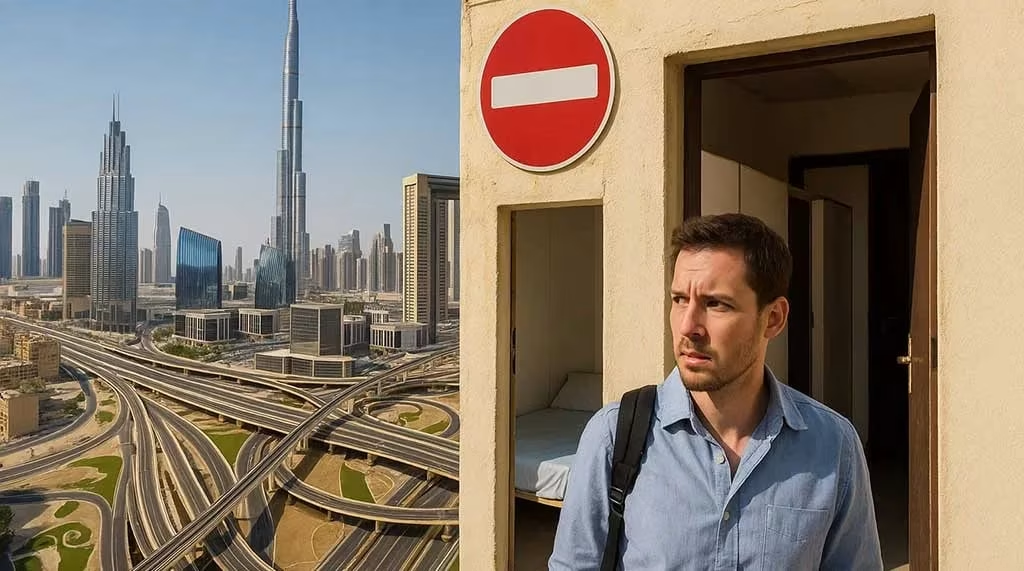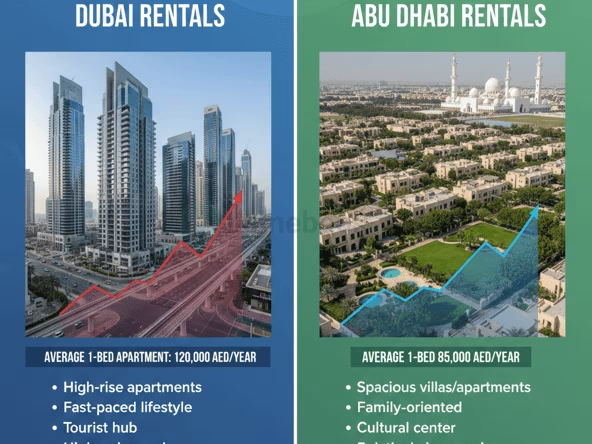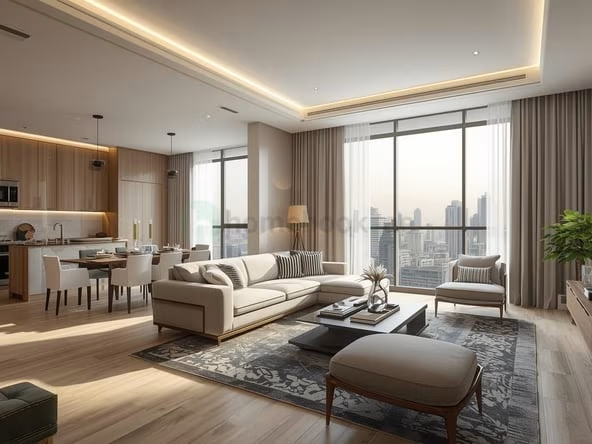Dubai’s relentless housing crackdown has set off a wave of change across the city, especially for the expats who’ve long relied on partition flats to make life here affordable. As authorities step up efforts to shut down makeshift, overcrowded apartments, entire communities have been left searching for somewhere new to call home.
The sudden enforcement drive is about more than just property rules—it’s reshaping how people live, where they work, and even which emirate they choose to call home.
In this article, we dive into why Dubai is targeting partition flats, who’s being affected, the growing exodus to places like Sharjah and Ajman, and what all of this means for the future of affordable housing in the UAE.
The Crackdown on Partition Flats
Dubai authorities, led by the Municipality in partnership with the Land Department and Civil Defense, have launched rigorous inspection campaigns in neighborhoods like Deira, Al Rigga, Satwa, Al Barsha and Al Raffa to remove unauthorized partitions and clamp down on overcrowded rentals.
These makeshift structures—often built with wooden boards or gypsum—are not just rule-breakers but serious fire hazards, frequently blocking ventilation, jeopardizing structural integrity, and hampering emergency evacuations.
Tenants and landlords face eviction orders, hefty fines up to AED 50,000, or even legal action if they’re caught subletting or modifying properties without proper permits.
Some landlords say they were unaware that tenants had made the changes. But others talk about costly repairs after the partitions were removed, such as dealing with water damage and mold.
It’s important to note that this crackdown is not just a short-term effort. Dubai is serious about enforcing safety regulations and preventing tragedies like deadly fires.
What Is Considered a Partition Flat?
An official partition flat in Dubai is any space split into smaller rooms using unapproved materials like gypsum board or plywood, built without formal approval from the Municipality, Civil Defence, or the Land Department.
These makeshift walls often include mini-entrances or foyers leading into subdivided areas—configurations clearly forbidden unless permits are granted, residents are registered on the tenancy contract, and building codes are met.
While the setup may stretch a standard one- or two-bedroom apartment into four, five, or more cramped “bed spaces,” it sidesteps vital safety measures like proper fire-resistant materials, ventilated corridors, and emergency exits.
Though such flats have become lifelines for low-wage workers seeking affordable, well-located housing, authorities now treat any unauthorized internal modification as illegal and unsafe—spot checks and fines follow swiftly.
Impact on Residents
For a lot of expats—think single workers, drivers, cleaners, and even some families—the sudden crackdown on partition flats has left people scrambling. It’s not just about losing a cheap place to sleep; it’s about waking up one day with an eviction notice and not knowing what comes next.
Legal rentals are just too expensive for many, so people are sharing tighter spaces, doubling up with friends, or even moving out of Dubai to places like Sharjah just to afford the rent.
The stress is real—some folks are worried about their jobs, their kids’ schools, or how they’ll cover bills next month. As one tenant said, “We’re having to start from scratch, and it’s hard to see where it ends.”
Families and Single Workers—Who Is Hit the Hardest?
It’s mostly single blue-collar workers and low-income families who are feeling the brunt of Dubai’s crackdown on partition flats. Single workers—especially those in delivery, retail, and cleaning jobs—often relied on bed spaces because their wages simply couldn’t stretch to regular apartments.
Families are also under pressure, particularly those with children in school, because they suddenly have to find new places that fit both their budgets and their kids’ schooling needs.
Some single earners have resorted to moving further out of town, commuting long hours just to keep their jobs, while others have even left Dubai altogether for more affordable options in Sharjah or Ajman.
Families, meanwhile, are often forced to double up with relatives or squeeze into small, crowded apartments to avoid disrupting their children’s education. In short, the hardest hit are those for whom Dubai’s “affordable” housing was already a stretch, and the options left are only getting slimmer.
The Shift to Other Emirates
Ever since Dubai started cracking down on partition flats, more and more expats are packing up and moving to Sharjah or Ajman. You hear it everywhere—Sharjah’s just close enough for the daily commute, but the rent difference is huge.
Ajman’s even cheaper, and folks say you can get a decent place without worrying about so many rules. Families are making the move too, weighing the hassle of school traffic against the relief of not emptying their bank accounts every month.
Still, life outside Dubai isn’t always simple.
People talk about early mornings, crowded highways, and having to build a new routine from scratch. Lately, movers and real estate agents have been swamped with calls, all because people are just trying to find a place they can actually afford to live.
Where Are People Moving?
Most people leaving Dubai’s partition flats are moving to Sharjah first, drawn by lower rents and a straightforward commute into the city. Ajman is another popular choice, especially among single workers and families looking for the cheapest options—some rentals there start as low as AED 500 a month.
According to Arab Times, workers who once paid AED 1,400 for a bed space in Dubai now rent for half that in Sharjah, even if it means a longer, more tiring commute.
Demand in these emirates has shot up, with local property agents noting an influx of Dubai expats searching for more affordable housing.
Families and single workers alike are choosing Sharjah and Ajman, and, in some cases, even Umm Al Quwain, as they look for a place that feels financially manageable—even if daily life gets a bit more complicated.
Challenges of Commuting
For those who’ve moved to Sharjah or Ajman after leaving Dubai’s partition flats, the daily commute has become a real test of patience and stamina. It’s not unusual to hear stories of workers spending two or even three hours each way, squeezed into crowded buses or crawling through traffic on the highways connecting the emirates.
Many people who leave Dubai for cheaper rental properties in Sharjah or Ajman face long and tiring commutes. They have to wake up early in the morning to go to work. In such a situation, they face heavy traffic and end up arriving home late at night with almost no time to spend with their family or relax.
The cost of getting around eats into what they save on rent, and summer makes it worse—imagine waiting for a bus in 45°C heat after a twelve-hour shift.
Parents say it’s tough managing school drop-offs and pickups, and some workers are now thinking about switching jobs just to avoid the daily grind. For those who moved, life is cheaper, but it comes with a whole new set of challenges.
How Employers Are Responding
Faced with longer commutes and shrinking housing options, some companies are stepping in to support their staff. A growing number of employers now offer transport allowances or organize shuttle services to ease the daily grind—especially for workers relocated to Sharjah or Ajman—since commuting two hours each way has become a real challenge.
In LinkedIn discussions, professionals argue businesses ought to rethink pay and benefits, suggesting firms either boost salaries or help cover accommodation costs so employees aren’t left choosing between a job and safe, stable housing.
Still, many smaller businesses are stretched thin, so whatever they can provide—whether a few extra dirhams or flexible shift timings—can make a world of difference for workers balancing tougher travel and tighter budgets.
Reactions and Solutions
Since the crackdown began, you’ll hear people everywhere—from WhatsApp groups to neighborhood shops—venting about rising rents and how tough it’s become to find a decent place in Dubai.
Some folks are frustrated, feeling pushed out by new rules, while others quietly agree that making flats safer is a good thing. On social media, it’s common to see tenants trading advice on where to find legal shared housing or passing along leads for affordable rooms in Sharjah and Ajman.
Agents say they’re getting nonstop calls for studio apartments and legal bed spaces, and it’s become normal for renters to double-check every contract before signing.
Meanwhile, a few smart landlords are knocking down illegal partitions and remodeling their units as proper studios, hoping to attract renters without breaking the rules.
No one thinks it’s easy, but people are helping each other out—and if anything, the search for a safe, affordable place has brought Dubai’s renters even closer together.
Finding Affordable Housing—What Are the Options?
With the demise of shared apartments, tenants are getting creative to find something that fits their budget. Many people in such situations are turning to studio apartments for rent in Dubai or legal shared apartments in older neighborhoods. They often team up with friends or colleagues to split the rent.
Online listings for rooms in Sharjah and Ajman are busier than ever, and WhatsApp groups are full of people swapping tips and links for decent deals. Some landlords, seeing the demand, are quickly remodeling old partitions into compliant studios or proper one-beds.
For those willing to commute, apartments in Sharjah or even Ajman offer real savings, but come with longer days on the road.
Either way, people say patience, teamwork, and a bit of flexibility are now the keys to landing an affordable spot in the UAE.
What’s Next for Dubai’s Housing Market?
Dubai’s housing market is at a turning point, and most experts expect more shake-ups ahead. With the crackdown on partition flats, rents for legal units have climbed, especially for studios and small apartments, while demand in neighboring emirates continues to rise.
Real estate agents report that many landlords are hurrying to convert their old setups into approved studios, hoping to tap into the surging need for affordable, single-person housing.
Still, unless more budget-friendly options open up in Dubai itself, people will likely keep moving outward, with Sharjah and Ajman picking up even more former Dubai residents.
There’s also talk that the government may roll out new guidelines or support for affordable housing, but for now, renters are bracing for more change, and the search for stability is far from over.
Either way, what happens next in Dubai’s rental scene is sure to shape how thousands of expats live and work in the UAE.
Conclusion
Dubai’s push to shut down partition flats has turned daily life upside down for thousands of expats. What was once a quick fix for affordable living is now off-limits, leaving many to face steeper rents or pack up for Sharjah and Ajman. For some, that’s meant squeezing into smaller spaces or spending hours every day on the road just to get to work.
Families are juggling new routines, and a lot of people are counting on friends or social groups to help find a roof they can actually afford. Landlords are scrambling to keep up, and real estate agents say the search for cheap, legal flats has never been harder.
One thing’s for sure: life for renters in Dubai is in flux, and nobody’s quite sure what comes next—but the hunt for something safe and affordable isn’t going away anytime soon.
Frequently Asked Questions
Not really. Unless it is officially approved. Because this type of layout is no longer allowed in Dubai.
A partitioned apartment is an apartment that is separated by additional walls. These types of apartments are usually designed to accommodate more people and split the rent.
You could lose your place fast, face a big fine, and sometimes even end up in court.
Mostly single guys and families who don’t make much—they counted on these flats just to get by.
Most people are heading to Sharjah or Ajman, where rents are cheaper and rules aren’t as tough. Some even try Umm Al Quwain.
It’s all about sharing legal flats with friends, hunting for deals in older buildings, or looking outside Dubai and accepting a longer commute.
Long commutes—sometimes hours each way—and less time for family or rest.
There’s talk, but for now, finding a cheap, legal place is still tough for most.



